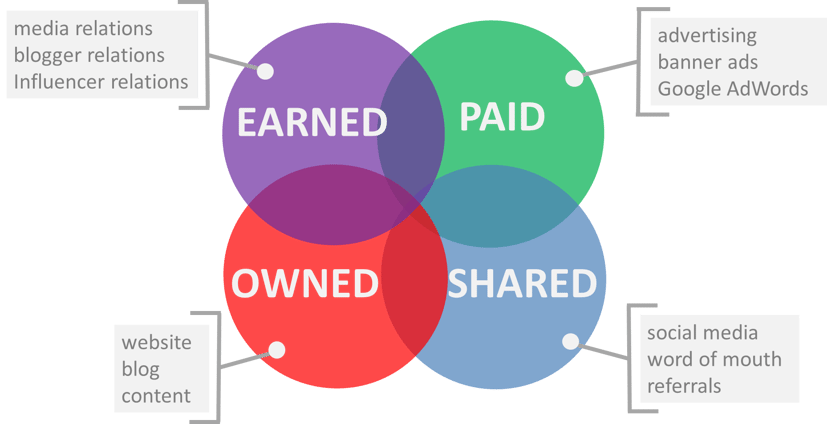One of the core functions of great content marketing is to have a documented strategy that, when executed, offers solutions to your targets' problems. When they're presented with a conversion trigger, they'll be much likelier to take an action. If none of the people who view your content take the next step in the customer journey, you may need to look into changing your content marketing strategy.
A documented marketing strategy is the driving force behind getting your content marketing to produce results that meet your company's goals. Without market research, tracking, and documented goals, you are just performing tactics haphazardly without really knowing what is working.
Constantly create valuable, resourceful, and entertaining content to make your website visitors, email subscribers, customers, and followers more informed and committed to your brand. You should do this to gain their trust, which leads them through the customer journey of eventually converting, making a sale, and becoming a loyal long-term customer.
This is why content marketing has to be performed consistently across different platforms, including paid, earned, owned, and shared media - also known as the PESO marketing model.
Content marketing, defined by Content Marketing Institute, is "a strategic marketing approach focused on creating and distributing valuable, relevant, and consistent content to attract and retain a clearly defined audience - and, ultimately, to drive profitable customer action."
In the business-to-business world, 88% of B2B marketers claim to be using content marketing as a tactic. In business-to-consumer industries, 76% of B2C marketers claim they are using content marketing.
But only a fraction of those businesses actually think that their content marketing is achieving results that they want. Of the 88% of B2Bs who are involved in content marketing, 30% of marketers said it was effective or very effective, with only 6% of those claiming it to be very effective.
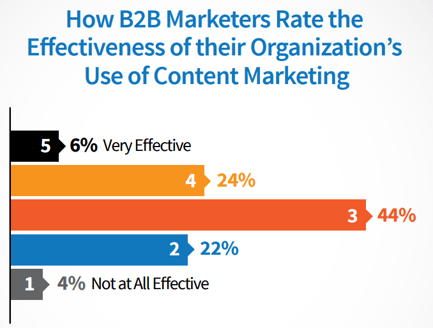
When it comes to B2C, 38% of respondents doing content marketing said it was effective or very effective, with 10% of those saying it was very effective.
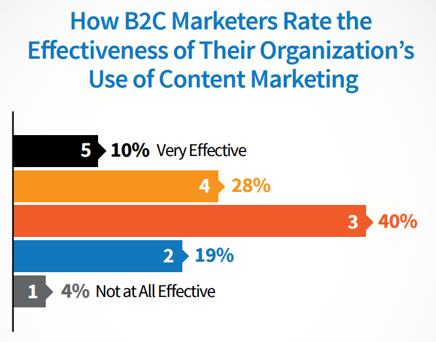
What does this mean?
Across the board, over 60% of marketers aren't seeing results from their content marketing efforts. A big reason for this is that they don't do the research, know their target audiences, set goals, and track everything along the way in a documented marketing strategy.
Do you have a content marketing strategy?
A documented content marketing strategy is often the defining factor in whether content marketing succeeds or fails. In fact, without a documented strategy, you'll only ever succeed by accident. Your strategy provides everything from data-driven research through to tactical execution, along with the analytics that show whether you've met your marketing goals.
So how many marketers in B2C and B2B have a documented content marketing strategy?
- Only 32% of B2B marketers have a documented marketing strategy, while 48% have a marketing strategy that is not documented.
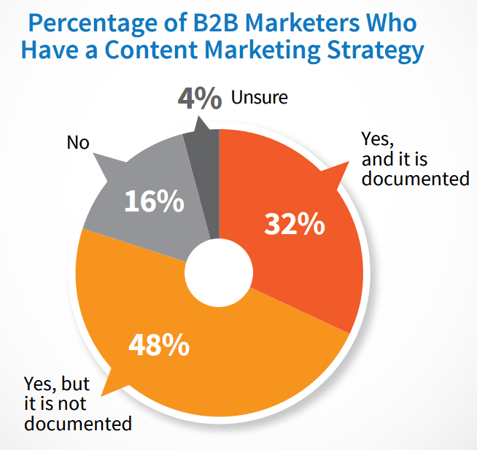
- In B2C, 37% of marketers have a documented strategy, while 44% don't document their strategy.
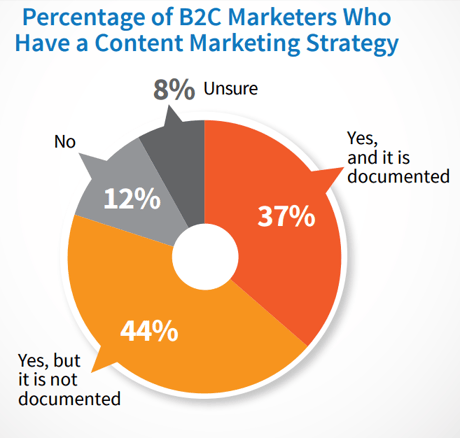
Strategies keep your brand's messaging consistent across all platforms, and tracking everything lets you know that what you’re doing is leading toward your goals. If your strategy is unrefined or nonexistent, there’s no way to ensure cohesive content marketing efforts.
Having a documented marketing strategy is the key to keeping everyone in your organization focused, so each employee knows exactly how their role plays out in an ongoing, collaborative effort. Some vague abstraction of a strategy that exists solely in the minds of one or two people on the content marketing team won’t serve the team as a whole.
EZMarketing’s brand strategist, Brandon Peach, had this to say about content marketing strategy:
“A content marketing strategy helps to tell the story of your business. It’s essential that a content marketing strategy be documented, since it’s been demonstrated year after year that content marketers who do so feel more effective, and can justify spending more on their content budget.”
Documentation is the proof that shows whether or not a marketing strategy is working, and if it is, companies are more willing to leverage a higher budget to continue evolving and optimizing their strategy.
Are you actively updating your content marketing strategy?
A strategy isn’t a once-and-done task. It’s something that needs revised and updated as the scope of your industry or business goals change. Strategy has to accommodate trends in the metrics you’ve measured, or the behavior of your target audience.
Your strategy should always be at the forefront of your mind and actions. It’s only natural for it to change according to key performance indicators (KPIs), the metrics important to your business, and when what you’re doing isn’t as effective as it could be.
The strategy that’s never updated is the one that can’t compete.
Do you have content marketing goals?
Consider why you use content marketing by asking yourself: “What do I want to accomplish?” You may have a strategy in place, but does it accomplish the goals you wanted to address in the first place?
A content marketing strategy should be born from the objectives put in place by the content marketing team. The chart below highlights common goals for B2B content marketers.
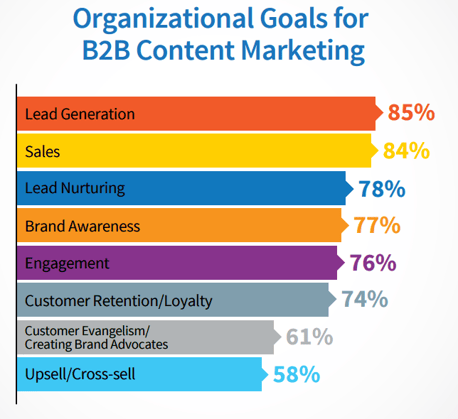
Your goals will define the specifics of your strategy. If your goal is lead generation and sales, then you might want to create more eBooks, case studies, and whitepapers in your content strategy to help generate more leads and sales.
In B2C, organizational goals are slightly different, with sales also being a top priority in all industries.
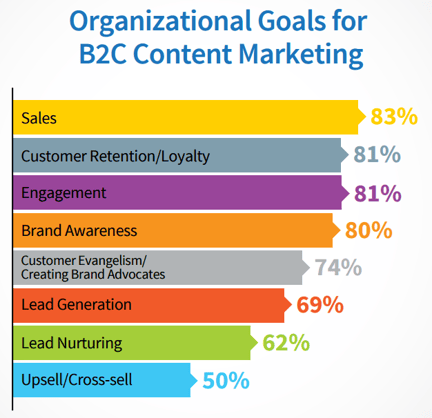
In B2C, if you want to focus on customer retention, then work on better customer service, and providing unique, relevant, and valuable content through email and social media to your subscribers and followers.
Objectives keep a marketing strategy goal-oriented and your content marketing results-driven.
Are you promoting your content?
Promoting content is one of the two key parts of content marketing: creation and promotion.
While your content marketing team may be churning out great content, if the process ends there then content marketing simply isn’t working hard enough for you. In fact, it’s probably not doing anything at all, because you haven’t taken the next step, which is promoting that content.
Most experts say you should spend just as much time, if not more, promoting your content as you do creating it.
What are some ways to promote your content?
Social media promotions, email marketing, influencer marketing, and industry outreach are all great ways to promote your content.
Writing a new post for your blog or publishing a cutting-edge eBook to your website isn’t enough. If your website has a strong following, then your current audience may find it - but your target audience who isn't aware of your brand probably won't. If your competition is creating helpful content, they will be found before you will be.
You can promote your content through paid content promotion services like Outbrain, or targeting specific audiences in Facebook or Twitter to get the word out. Also, reaching out to industry publications, bloggers, journalists, and writers to let them know about your content and how it may be helpful for their audience. Figuring out the sites to place your content where your target audience visits takes a bit of work. But Rand Fishkin from Moz explains how to discover the sites your audience visits in this extremely helpful whiteboard video.
Marketers who spend more time promoting their content on the right platforms and websites will see more success than businesses who spend more time creating and not enough time promoting.
Are you spending enough on content marketing?
As we've said above, too few companies think that their content marketing is actually effective. Those same companies may not be spending enough money or time on their content marketing either, which can be a contributing factor to their lack of confidence (and results).
If you’re spending a minimal amount on content marketing, then it’s difficult to expect it to do everything it’s supposed to do as effectively as you need it to. Content marketing is about ROI, and if you’re not investing enough, you won’t be seeing those huge returns.
So what percentage of marketing budgets are being spent on content marketing?
For B2B, the average is about 28% of marketing budgets that are being spent on content marketing. The marketers that found content marketing to be the most effective were allocating 46% of their total marketing budget on content marketing.
Are you spending almost half of your marketing budget on content marketing? Those that see the best results are.
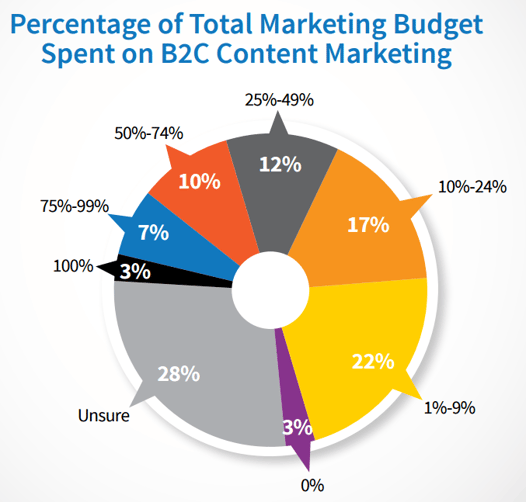
In B2C, 32% of marketing budgets are being spent on content marketing. The most effective marketers say that about 38% of their marketing budget is being spent on content marketing.
So what are you allocating from your whole marketing budget on content marketing?
It’s been shown that companies with strategic content marketing generate a higher percentage of leads than companies who don’t.
Ask yourself: "Is my content marketing working for me?"
Here's the bottom line. If your content marketing isn’t working for you, it could be any number of things—from a nonexistent strategy, lack of promotion, a stifled budget, or unclear objectives and goals.
If you’re still wondering about where your content marketing stands, contact EZMarketing and we’ll do more than just develop content for you—we’ll help you create the strategy that gets results. Our Lancaster digital marketing agency offers content marketing a core internet marketing service.
